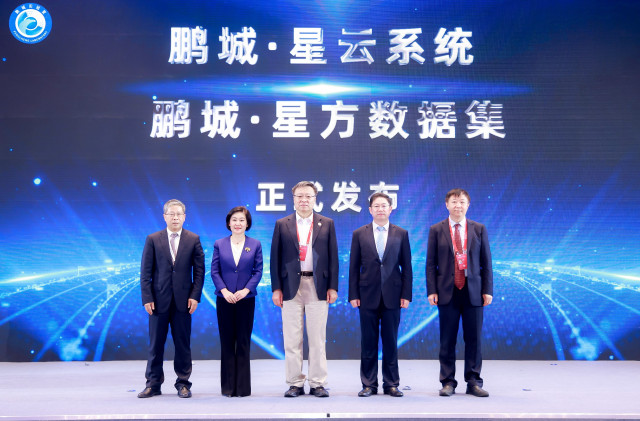On May 22, Peng Cheng Laboratory released the Peng Cheng · Nebula System and the Peng Cheng · StarSquare Dataset at the 2023 Greater Bay Area Science Forum, aiming to support international big science projects in the fields of remote sensing and astronomy.

(Photo provided to GDToday)
The Peng Cheng · Nebula System, a research cloud platform for remote sensing and astronomy, is built on the large-scale scientific infrastructure "Peng Cheng Cloud Brain II" with E-level AI computing power. It provides three major functions: intelligent production services for multi-domain and multi-modal data, interdisciplinary AI+ algorithm research services, and collaborative research and communication services across disciplines.
The StarSquare Dataset is analysis ready data (ARD) produced by this system and can be directly applied to scientific research. The Peng Cheng · Nebula System and StarSquare Dataset will leverage the advantages of AI technology in data research applications, focusing on concepts such as the water cycle, carbon cycle, and sustainable urban development. At the same time, they will help break through key technologies and conduct research in the fields of cosmic origins and galaxy evolution.
Peng Cheng Laoratory also signed cooperation memorandums with National Remote Sensing Center of China (NRSCC) and Guangzhou University respectively during the forum. The three sides will jointly utilize the Peng Cheng · Nebula System to carry out strategic, forward-looking, targeted international scientific and technological innovations and collaborative researches in the fields of aerospace information, artificial intelligence development and will also cooperate on the data processing part of the international big science project, the Square Kilometre Array (SKA), and conduct research collaborations in fundamental disciplines such as astronomy, geography, and mathematics.
Currently, various large-scale scientific research projects are facing opportunities and challenges brought by massive data. On the one hand, the massive amount of remote sensing data and its derived product's information gradually have become core scientific data driving research on global sustainable development goals, such as carbon peak and carbon neutrality.
On the other hand, with the deepening of large-scale astronomical survey programs both domestically and internationally, the massive astronomical data and the complexity of research also present unprecedented challenges to the astronomical exploration.
Artificial intelligence (AI), based on its multidimensional understanding and learning ability of complex systems, can provide new tools for data analysis in the fields of remote sensing and astronomy, and it has broad application prospects.
And the Pengcheng Nebula System will be driven by the needs of international big science projects, focusing on the disciplines of astronomy and remote sensing. It will support the scientific research of the Square Kilometre Array (SKA) and the Group on Earth Observations (GEO), offering solutions for tackling complex problems and addressing human's common challenges.
Gao Wen, Academician of Chinese Academy of Engineering, Director of Peng Cheng Laboratory, Zhao Jing, Director-General of National Remote Sensing Center of China (NRSCC), Wei Minghai, Party Secretary and President of Guangzhou University, Yang Jun, Deputy Director of Guangdong Provincial Department of Science and Technology, and Gong Peng, Vice President of the University of Hong Kong attended the forum.
Square Kilometre Array (SKA)
The Square Kilometre Array (SKA) project is an international effort to build the world's largest radio telescope, with a square kilometer of collecting area. It is a alliance organization by more than 10 countries, including China. The SKA will use thousands of dishes and up to a million antennas that will enable astronomers to monitor the sky in unprecedented detail and survey the entire sky thousands of times faster than any system currently existing. The SKA will extend to at least 3000 km from a central core region. It will address fundamental unanswered questions about our Universe, including how the first stars and galaxies formed after the Big Bang, how dark energy is accelerating the expansion of the Universe, the role of magnetism in the cosmos, the nature of gravity, and the search for life beyond Earth.
Group on Earth Observations (GEO)
The Group on Earth Observations (GEO) is the largest inter-governmental organization in the field of Earth Observations. It is a partnership of more than 100 national governments and in excess of 100 Participating Organizations that envisions a future where decisions and actions for the benefit of humankind are informed by coordinated, comprehensive, and sustained Earth observations. A central part of GEO's mission is to build the Global Earth Observation System of Systems (GEOSS), which is a set of coordinated, independent Earth observation, information, and processing systems that interact and provide access to diverse information for a broad range of users.
















